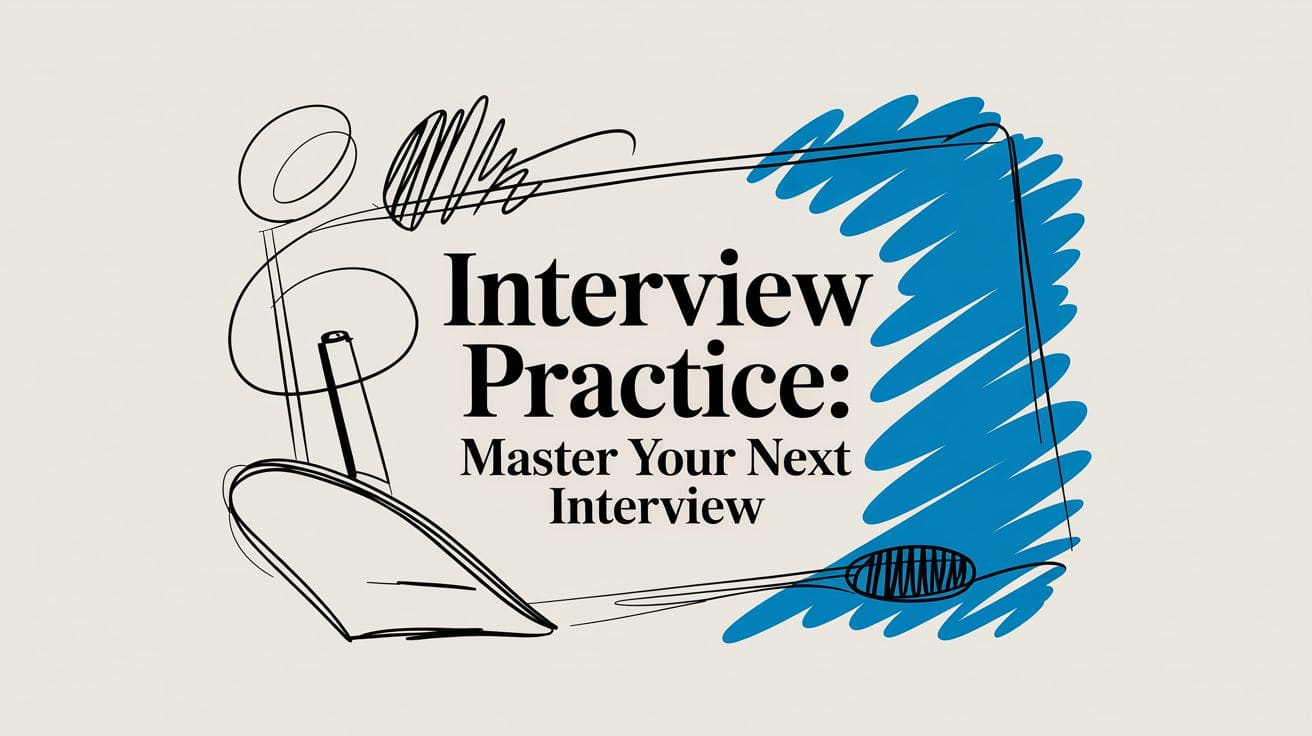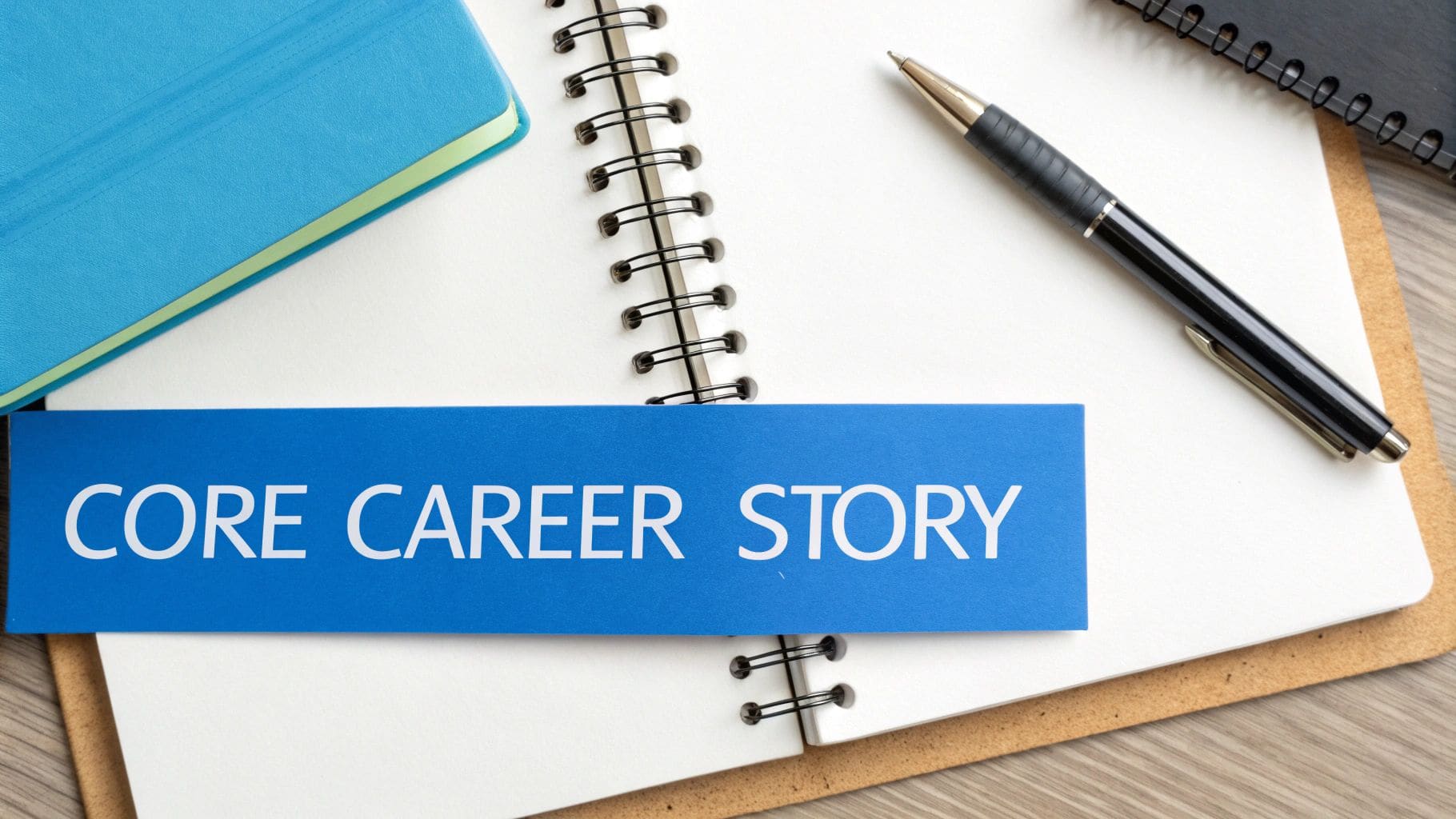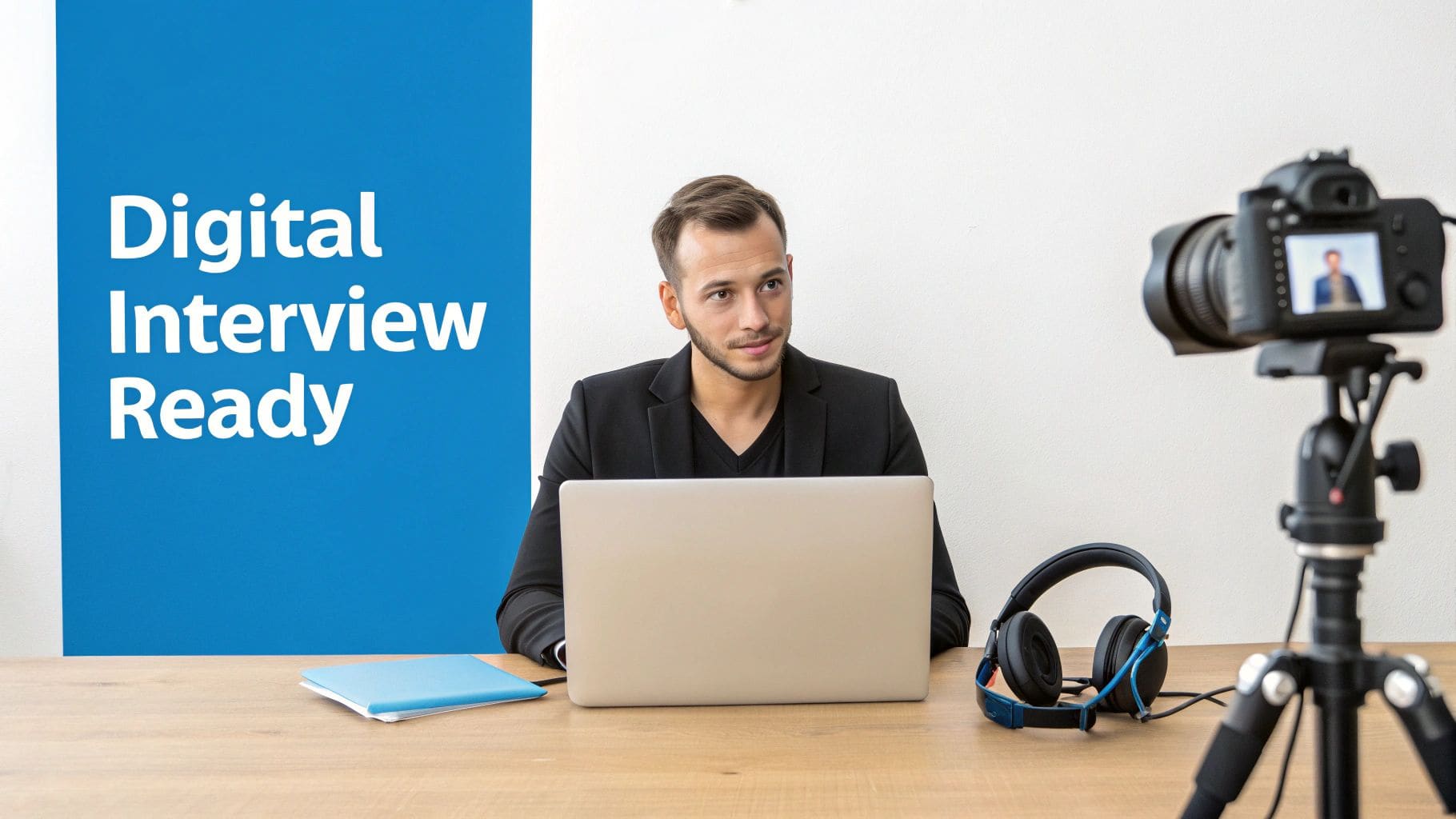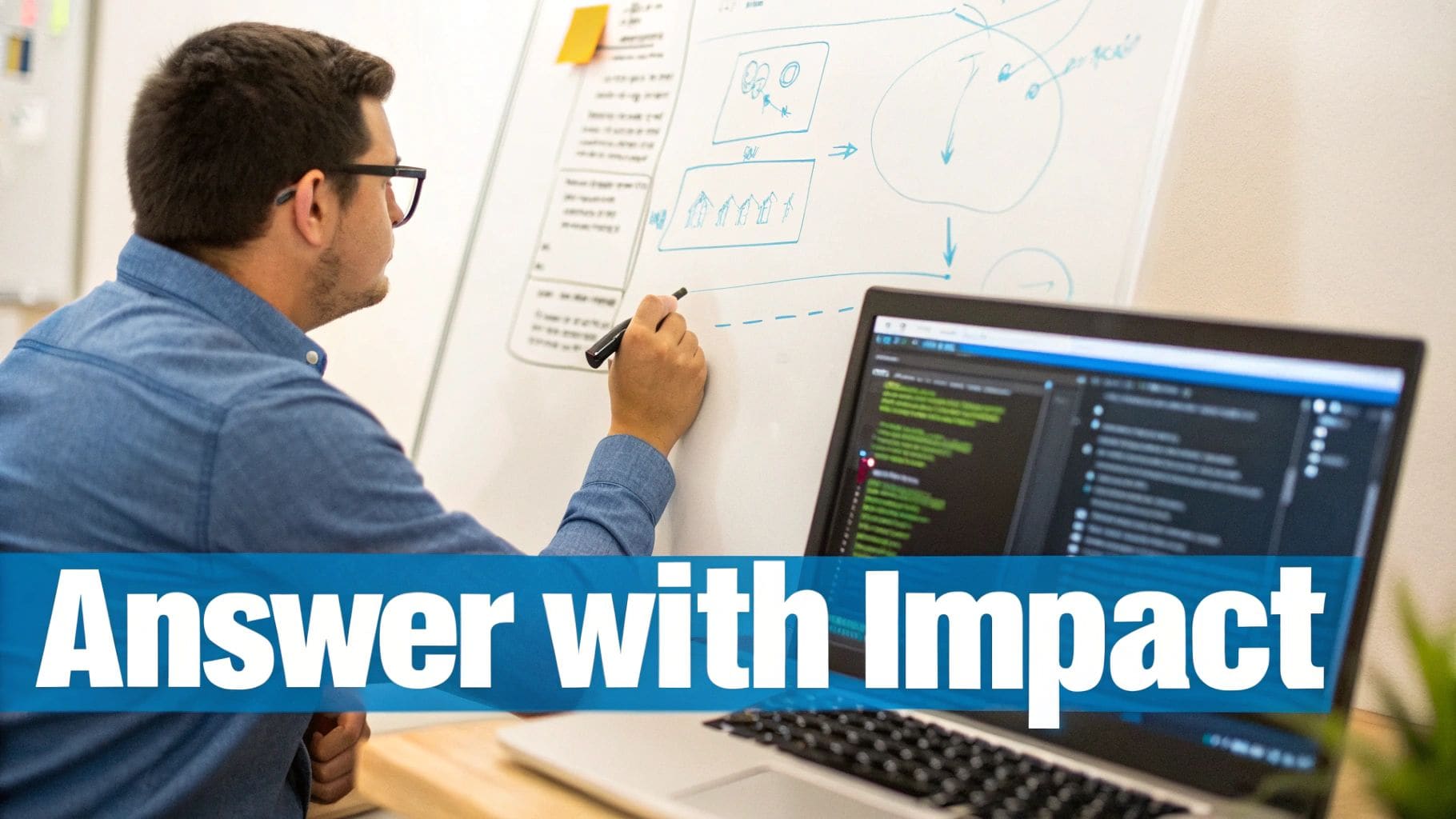The Ultimate Guide to Effective Interview Practice
Grow your interview practice with actionable tips, mock questions, and proven strategies to ace your next interview.

The Ultimate Guide to Effective Interview Practice
Effective interview practice involves running through realistic, structured simulations of the questions you'll face. But here's the key: the goal isn't memorisation. It's storytelling. It's about building the muscle memory to talk about your value clearly and confidently. When you do it right, preparation stops feeling like a chore and becomes your biggest competitive advantage, letting you lead the conversation instead of just reacting to it.
Why Effective Interview Practice Is Non-Negotiable
Walking into an interview unprepared is like showing up to a marathon without ever having gone for a run. Your talent and experience might get your foot in the door, but they won't carry you across the finish line with a job offer.
The modern job market is brutal. That makes dedicated, smart practice more critical than ever.
The numbers don't lie. For any given job opening, you're up against an average of 118 other applicants. Only about 20% of those even land an interview. Of that small group, fewer than a third—just 30.89%—actually receive an offer. This data, highlighted in a recent AI in hiring report from Insight Global, shows just how picky employers can be. You absolutely have to stand out.
Moving Beyond Memorisation
So many candidates think "preparation" means memorising answers to common questions. That approach usually backfires. You end up sounding robotic, and your answers feel impersonal, failing to connect with the interviewer on a human level.
Real interview practice isn't about reciting a script. It's about mastering your own professional story.
The goal is to know your key accomplishments, skills and career highlights so well that you can adapt them to any question that comes your way. Think of it as the difference between learning a few phrases in a new language and becoming fluent enough to have a real conversation.
The Real Benefits of Strategic Practice
When you actually dedicate time to a structured routine, you get tangible benefits that go way beyond just "feeling prepared." It's a direct investment in your performance when you're sitting across from the hiring manager.
Here's what you gain:
Reduced Anxiety and More Confidence: When you know what to expect, the interview process becomes less intimidating. This calms your nerves and lets your actual personality come through.
Clearer, More Concise Answers: Practice helps you cut the fluff from your stories. You learn to deliver high-impact, relevant information without rambling on.
Improved Storytelling Ability: You get better at framing your experiences as compelling stories that showcase not just what you did, but how you solve problems and deliver results.
"Confidence comes from discipline and training. The more you sweat in practice, the less you bleed in battle."
This timeless principle applies perfectly to interviewing.
By committing to deliberate preparation, you shift the interview from a scary interrogation into a genuine opportunity to prove your value. This proactive approach also keeps you organised, a task made much easier with a solid job application tracker to manage your opportunities.
In the end, consistent preparation is what builds the bridge from being just another qualified candidate to becoming the person they hire.
Ace Your Next Interview
Practice with AI-powered mock interviews and get instant feedback
Crafting Your Core Career Story

That classic opener, "Tell me about yourself," is far more than just a warm-up. It's your golden opportunity to frame the entire conversation before it even begins. This is where truly effective interview practice starts—not with memorising answers, but with building a core career story that positions you as the perfect solution to their problem.
Simply walking through your resume chronologically is a missed opportunity. It's your job to connect the dots for the interviewer, turning a list of past jobs into a compelling, purposeful journey. Your story should be a concise, engaging summary that weaves together your key skills and biggest wins, all tailored to the specific role you're after. Get this right, and it becomes the foundation for almost every other answer you'll give.
Identify Your Pillar Accomplishments
First things first, look back over your career and pull out three or four of what I call "pillar" accomplishments. These aren't just your daily duties; they are the specific moments you delivered significant, tangible value. Think about a project you spearheaded, a tough problem you solved, or a metric you sent through the roof.
For each one, get specific with the results. Did you boost revenue by 15%? Slash customer churn by launching a new feature? Quantifying your impact is what makes your story credible and, more importantly, memorable. These pillars are the concrete proof points your narrative will be built on.
Structure Your Narrative
A great career story has a clear, logical flow that's dead simple to follow. This isn't the time for a long-winded autobiography. Instead, use a simple structure to keep your listener hooked from start to finish.
A proven framework that I've seen work time and time again is:
The Present: Kick off with where you are right now—your current role and your core area of expertise. Keep it brief and high-level.
The Past: Now, connect the dots from your past experiences. Cherry-pick one or two of those pillar accomplishments that are most relevant to this new job. You need to explain how those wins have perfectly equipped you for this next challenge.
The Future: Bring it home by explaining exactly why you're excited about this specific opportunity. This is where you show you've done your homework. Connect your skills and ambitions directly to the company's mission and the role's requirements.
This structure transforms your answer from a rambling history lesson into a targeted, persuasive pitch. For a deeper dive, our dedicated article on how to answer "tell me about yourself" breaks this down even further. Honing your practice on this question alone can dramatically shift the entire tone of your interviews.
Your career story isn't just about what you've done. It's about explaining why it matters to your next employer. It should logically lead them to the conclusion that you are the right person for the job.
By mastering this narrative, you seize control of the first impression. You're no longer just another candidate with a decent resume; you're a professional with a clear vision and a proven track record of delivering results. This single shift makes all your preparation more focused, confident and impactful.
Winning in Digital and AI-Powered Interviews

The interview landscape has fundamentally changed. If your prep strategy still looks the same as it did five years ago, you're falling behind. Excelling in a virtual or AI-driven interview requires a completely different skill set—one that blends strong answers with a seamless tech setup and the ability to project confidence through a screen.
The data backs this up. By 2025, an estimated 90% of employers will be using video interviews. At the same time, a staggering 87% of hiring managers are already using AI tools for screening resumes and even conducting initial interviews. Yet, candidates are still struggling with the basics, with 62% reporting technical issues like bad connections. If you want to dive deeper, you can explore the evolution of digital hiring practices on standout-cv.com.
Your interview practice has to evolve. It's no longer just about what you say, but how you deliver it in a digital environment.
Mastering Your Virtual Setup
In a video call, your environment is part of your professional brand. A glitchy setup or poor lighting can completely undermine your expertise before you even answer the first question.
Run through this quick tech checklist before every single virtual interview:
Light Yourself From the Front: This is non-negotiable. Position your primary light source in front of you. A simple ring light is great, but even a lamp placed behind your laptop works wonders. It ensures they can see your expressions clearly.
Ditch the Laptop Mic: Your computer's built-in microphone is designed to pick up everything, including echoes and background noise. A basic headset or an external microphone will make you sound crisp, clear and professional.
Curate Your Background: Your background should be simple and non-distracting. A neutral wall or a tidy, organised bookshelf is perfect. I strongly recommend avoiding virtual backgrounds—they often glitch, look unprofessional and can be more distracting than the real thing.
A seamless technical setup signals professionalism and attention to detail. Do a full test run with a friend the day before the interview. Check your camera, mic and internet connection to work out any kinks ahead of time.
Navigating One-Way and AI-Screened Interviews
Get ready for the asynchronous or "one-way" video interview. This is where you record your answers to pre-set questions without a human on the other end. It feels weird and unnatural, but it's becoming a standard first-round screening tool.
The trick is to treat the camera lens as if it were the hiring manager. Make direct eye contact with the camera, not your own face on the screen. Smile, use hand gestures for emphasis and project genuine energy.
AI screening tools take this a step further. They often analyse your responses for specific keywords whilst also assessing your communication style—your tone of voice, your pacing and even your facial expressions. This means your preparation has to account for both the human and the algorithm.
Structure your answers clearly, using language that mirrors the job description. This helps the AI recognise that your skills are a match. But don't turn into a robot. Your goal is to find the sweet spot between keyword optimisation and authentic, human connection. If this sounds daunting, working with an expert interview coach can give you the personalised feedback you need to master your delivery for any audience.
The interview formats themselves have become part of the test. How you adapt your practice for different types of interviews can make all the difference.
How to Adapt Your Practice for Different Interview Formats
| Format Type | Key Challenge | Primary Practice Focus |
|---|---|---|
| Traditional In-Person | Building rapport and reading non-verbal cues from the interviewer. | Body language, firm handshake, active listening and thinking on your feet in a live setting. |
| Live Video (Zoom, Teams) | Projecting energy and engagement through a screen without direct feedback. | Camera eye contact, vocal variety, clear audio and maintaining a professional background. |
| One-Way & AI Video | Sounding natural and authentic when talking to a screen with no human interaction. | Structuring concise answers, incorporating keywords from the job description and conveying enthusiasm. |
Ultimately, successful preparation today is about blending technical readiness with sharp communication skills. By preparing for the unique challenges of each format, you ensure your qualifications shine through, no matter what platform you're on.
Answering Tough Behavioural and Technical Questions

This is where the rubber meets the road. Answering tough questions is what separates a good candidate from the one who gets the offer letter. It's the moment where dedicated interview practice really pays off, moving you from simply knowing your stuff to articulating it clearly under pressure.
Behavioural and technical questions are designed to test completely different skills—one looks at your past actions, and the other evaluates your real-time problem-solving. Acing both requires two distinct game plans.
The good news? Hiring is getting more methodical. A full 72% of companies now use structured interviews to standardise their process and weed out bias. This shift means your performance on these specific question types matters more than ever.
Beyond the STAR Method for Behavioural Questions
Look, the STAR method (Situation, Task, Action, Result) is a decent starting point. Everyone knows it. But relying on it too rigidly can make you sound like you're reading from a script.
Effective practice for behavioural questions isn't about the formula; it's about the story you tell. Your goal is to pick powerful examples that do more than just answer the prompt—they reveal your character, your resilience and how you show up for a team.
Instead of grabbing the first project that comes to mind, be more strategic. Ask yourself:
Which story best shows my leadership? Think about a time you had to guide a team through a messy situation or take ownership of a failing project.
Which example really demonstrates how I solve problems? Pick a scenario where the solution wasn't obvious and you had to think on your feet.
Which accomplishment highlights my actual impact? Zero in on stories with measurable, positive outcomes.
The most compelling behavioural answers aren't just about what you did. They're about how you think, learn and contribute to a team's success. Your story needs a clear beginning, a challenging middle and a triumphant end.
Articulating Your Technical Problem-Solving Process
Technical interviews aren't just a quiz to see if you can spit out the right answer. The interviewer wants to see how you get there. They're evaluating your thought process, your ability to communicate complex ideas and how you handle it when you hit a wall. This is why practising thinking aloud is so critical.
During your preparation, don't just solve problems silently in your head. Talk through every single step. Start by clarifying the requirements and constraints. Then, walk them through your initial thoughts, potential approaches and the trade-offs of each. For specific fields, practising with real-world examples, like these common Python interview questions, is the best way to build this muscle.
This verbal walkthrough shows the interviewer you're methodical and collaborative, not just a lone genius.
And if you get stuck? Don't panic. Explain what you're thinking and what part of the problem is tripping you up. This shows self-awareness and proves you can stay calm under pressure. Sometimes, just talking it out is enough to unlock the solution. To get some reps in, check out our guide on common job interview practice questions and start testing your skills.
Final Touches That Make a Lasting Impression
The days right before an interview are your last chance to turn solid preparation into a standout performance. This is where all your dedicated interview practice comes together, shifting the focus to the small details that create a powerful, lasting impression. You've already done the heavy lifting by preparing your answers; now it's about refining your delivery and approach.
One of the most valuable things you can do is a full-scale mock interview. Grab a trusted colleague or mentor and ask them to hit you with their toughest questions. The goal isn't just to see if you can recite your answers—it's to get honest, unfiltered feedback on your body language, tone and how clearly you're telling your stories. This kind of rehearsal is the closest you'll get to the real thing, and it does wonders for your confidence.
Researching Your Audience
Go deeper than the company's mission statement. Spend a few minutes researching your interviewers on LinkedIn. You're not trying to be a detective, just looking for professional common ground. Did you go to the same university? Do you share a mutual connection? Maybe they recently published an article or spoke at a conference.
Finding a small, genuine point of connection can help you build rapport from the first minute. It shows you're proactive and genuinely interested in the people you'll be speaking with. Beyond the interview, understanding the psychology of first impressions can give you a real edge in any professional setting.
Your final prep isn't about cramming more information. It's about calming your nerves, building rapport and ensuring every detail—from your questions to your outfit—is handled with professional polish.
Preparing Your Questions and Managing Nerves
The questions you ask at the end of an interview are just as important as the answers you give. This is your moment to show you've been listening and thinking critically. Skip the generic questions about company culture that you could have Googled.
Instead, prepare a few insightful questions that prove your engagement.
"I saw the company recently launched [Product X]. What were some of the biggest challenges the team faced, and what did you learn from that process?"
"Based on our conversation, it sounds like [specific priority] is a key focus. How will this role directly contribute to that goal in the first six months?"
"What does success look like for the person who takes this role, and what are the key performance indicators?"
Finally, get a handle on those pre-interview jitters. It's completely normal to feel nervous, but your preparation should have given you the tools to manage it. On the day of the interview, avoid any last-minute, frantic cramming. Instead, do something that calms you down—listen to music, go for a short walk, or try a few breathing exercises. Trust the prep you've already done.
And remember, the conversation isn't over when you walk out the door. A well-crafted thank you note is a critical final step that reinforces your interest and professionalism. Tools like a follow-up generator can help you create polished messages that leave a great final impression.
Got Questions About Interview Practice? We've Got Answers
Even with the best game plan, a few nagging questions always pop up when you're deep in interview prep. Getting these sorted is what separates good preparation from great preparation.
Let's clear up some of the most common sticking points so you can focus your energy where it'll make the biggest difference. It's not about practising harder—it's about practising smarter.
How Much Time Should I Actually Spend Practising?
There's no magic number here, but a solid rule of thumb for a high-stakes interview is 10-15 hours of dedicated prep time. Don't try to cram this into a single night. The goal is consistent, focused effort spread out over a week or two.
Here's a realistic breakdown of how to spend that time:
Company Deep Dive (2-3 hours): Go beyond the "About Us" page. Really get to know the company, the specific role and the people who will be interviewing you.
Crafting Your Stories (3-4 hours): This is where you map out your key career wins and pillar accomplishments. Script them, refine them and know them inside and out.
Running Mock Interviews (4-5 hours): Aim for at least two or three full mock interviews. Get a friend, a mentor, or use a tool to simulate the real thing.
Prepping Your Questions (2-3 hours): Prepare insightful questions to ask them. This shows you're engaged and genuinely interested.
One of the biggest mistakes I see candidates make is rushing the process. Seriously, it's often better to ask to postpone an interview by a few days than to walk in unprepared. It shows you respect their time and are self-aware enough to know when you're ready.
How Do I Practice for "Cultural Fit" Without Sounding Fake?
This is a big one. Practising for "cultural fit" feels weird because nobody wants to sound like they're putting on an act. The secret isn't to invent a new personality—it's to find the genuine overlap between your values and theirs.
Start by digging into the company's mission and values. Look at the language they use in job descriptions. Do they talk about "collaboration," "autonomy," or "innovation"? That's your clue.
Next, think about your own work style. Find real examples from your career where you absolutely thrived in a similar environment. For instance, if they value "customer obsession," have a story ready about a time you moved mountains to solve a user's problem. This keeps your answers authentic whilst still showing you're exactly what they're looking for.
What Are the Best Tools for Mock Interviews?
Let's be honest, finding the right person for a mock interview can be a pain. Your friends might be too nice, and mentors are often slammed with their own work. This is where technology can be a huge help.
AI-powered platforms have a major advantage: they give you instant, unbiased feedback, and you can use them whenever you want. They can break down your delivery, your word choice and how well you structure your answers, giving you concrete advice that a peer might miss.
The point of a mock interview isn't just to recite your answers. It's to simulate the pressure of the real thing. Using a tool that gives you structured, data-driven feedback is how you find—and fix—the weak spots in your communication.
Ultimately, the best interview practice is a mix of self-prep, feedback from people you trust and smart use of technology. By tackling these common questions head-on, you can fine-tune your strategy and make sure every minute you spend preparing gets you one step closer to that offer.
Ready to transform your preparation? The CV Anywhere Interview Coach provides realistic AI-powered mock interviews and instant feedback to help you master your delivery and walk into any interview with total confidence.
Tags
Related Articles
10 Common Behavioral Interview Questions and How to Answer Them
Preparing for the most common behavioural interview questions is the single best way to demonstrate your competence, problem-solving skills, and cultural fit. Unlike technical questions that test what...
Read more →How to Answer Tell me About Yourself: A Quick Guide
How to Answer Tell me About Yourself: A Quick Guide When an interviewer says, "Tell me about yourself," it's your chance to set the tone. A great answer frames you as the perfect candidate, whilst a w...
Read more →How to Write a UK Cover Letter That Gets You Hired in 2026
To learn how to write a cover letter for the UK job market, you need to turn your CV from a dry list of facts into a compelling story that connects your skills directly to the employer's needs. The pe...
Read more →Popular Articles
Finding the right cv template google docs can be a great starting point for your job search, but it's often not the most effective path to getting hired. Whilst templates offer a visual framework, the...
The best way to craft a comprehensive and professional CV of curriculum vitae is with a dedicated tool like CV Anywhere's CV builder. It ensures your document is perfectly formatted and optimised to h...
Stop searching for the perfect template of resume. Trawling through hundreds of options to find one that fits your experience is an outdated, frustrating process. The solution isn't a better template;...
Here is a detailed breakdown of the 12 best options for a resume maker for free available today. We've done the research for you, so you can stop searching and start building a professional, job-winni...
Picking the right resume templates is your first—and most important—move in getting a recruiter's attention. It's not just about looks; a great template is a strategic tool. It organizes your career s...